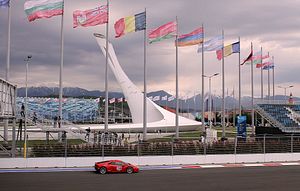The Olympic torch might be no longer burning over Sochi but its legacy is still in the air. Despite sweeping predictions about the city gradually turning into a high-modernist ghost town, new construction cranes are mushrooming across the skyline, together with six million tourists visiting throughout this year.
Sochi’s infrastructure was in decrepit condition before the Olympics and had not seen renovations since the Soviet era. Imeretinsky Kurort railway station, nowadays one of the largest in Russia, used to be a puny end-of-the-line stop. The Olympic Village site was covered with bogs while the road connecting Adler, a major city district, with the downtown only existed on cadastral maps.
In effect, the biggest share of the Winter Games’ $50 billion price tag was allocated for erecting new roads and other infrastructure from scratch. Putin was justifying mammoth spending by promising long-term returns and Sochi, shortly thereafter, was projected to materialize as the first world-class resort in Russia.
But after the lights went dark in the Olympic Park, this “Russian Riviera” was closer to recreating the haunted post-Olympic images of Athens and Beijing than transforming into a major tourist hub.
Sanctions and the ruble collapse put pressure on the municipal budget of 2014. Some Russians believed that it might be their last chance to travel abroad before the domestic economy hit its lowest ebb, whereas others invested everything they were able to lay hands on in attempts to protect savings from depreciation.
The annexation of Crimea was another blow. The Kremlin boasted about its new trophy and promised to restore the peninsula’s former Soviet laurels as a tourism pearl; meanwhile, the emergence of another Black Sea resort meant disaster for Sochi.
It is fair to say, however, that the situation started to improve a year later. The Russian government saw Sochi’s deadlock and decided to subsidize tours for the budgetniki, a term used to describe millions of state employees. The famous beach promenade became crowded once again, for the first time since the Olympics, although businesses were adjusting to travelers with modest purchasing power.
The government, meanwhile, was still running a budget with a big deficit and spending below the 2013 level. Subsidies did not seem to be sufficient as budgetniki were unwilling to spend much during their vacations; therefore, all-included tours toppled tourism offers.
The winds of change started blowing from an unexpected direction. Even a year ago, Sochi was too Russian and not cosmopolitan enough for the well-off and those in the middle class, who had become accustomed to overseas holidays during the “fat years” of the oil boom. But a deepening recession and the Kremlin’s sanctions against Turkey in response to a downed Su-24 jet prompted vacationers to look to Sochi as an alternative destination.
Sochi unexpectedly metamorphosed into a playground for travelers who had to pull their budget belts in a notch but could still afford ritzy local vacations. The new wave of tourists was different from the previous one; newcomers had enough money to book expensive hotels and purchase things they liked right and left.
Chaika and other expensive restaurants in Sochi and Krasnaya Polyana now boast Bentleys and Mercedes Maybachs parked near the entrances. In like manner, a bottle of beer in Sky Club, a popular nightlife spot, now costs almost 500 rubles ($8). Some hotels, such as Hyatt Regency, have started charging thousands of rubles for accessing beaches that were public not long ago, causing uproar across local media.
As southern Europe is no longer affordable for real estate investments due to the ruble’s collapse, more Russians are probing condos in Sochi, with its warm subtropical climate. In effect, the city’s population is projected to grow at one of the fastest rates countrywide by adding tens of thousands of newly registered residents by the end of the year.
The Kremlin wants to further capitalize on this blessing in disguise. Prime Minister Dmitry Medvedev recently signed a law aiming to transform former Olympic venues sitting on 165,000 square meters of land at Krasnaya Polyana into a gambling zone. The Olympic Village has also become the single Russian Formula-1 venue and the Fisht stadium is undergoing renovations to host matches of the 2018 FIFA World Cup.
The extravaganza might seem excessive, while the country is surviving one of the worst recessions since 2008. As a result, Sochi has started manifesting populist and conservative values, underlining its role within the state ideological play. The first Russian Orthodox resort, Lesnoye, recently officially opened in the city; more are scheduled to emerge in the upcoming months. Sochi will also see a new monument of Joseph Stalin coming to light in a few weeks, while the Cossacks are now patrolling the streets along with the police.
Sochi’s growth resembles a feast in a time of plague. Based on a survey by popular real estate internet portal Domofond.ru, the city was recently ranked as the most expensive place for renting an apartment across Russia. An average family of two spends 17 percent on average of its monthly income on rent, whereas in Sochi families are spending 34 percent. In addition, local prices on food equal those of Moscow, in effect. Many residents can simply no longer afford living in the city’s vicinity. Meanwhile, Sochi owes almost 340 million rubles ($5.5 million) in unpaid utility bills to the state corporations which, in return, are threatening to cut off gas and hot-water supplies.
Despite being an exception, if compared to previous Olympic sites, Sochi cannot remain isolated from the rest of Russia in the long-term. If the Russian economy continues its downfall, vacations will turn into an unattainable luxury for many; meanwhile, the city will similarly suffer should the possible growth of oil prices trigger overseas trips once again. Sochi is caught in a Catch-22 scenario; yet, for now, it is continuing to grow against all odds.
Dmitriy Frolovskiy is a Moscow-based writer. His writings have been featured in the New York Times, Forbes, The Diplomat and others.

































